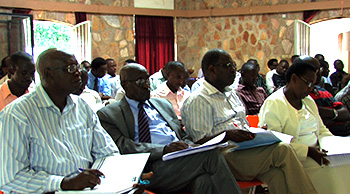Restoring the truth about the Burundian conflict

It has been 41 years since the tragic events of April 1972 in Burundi, following which thousands of people were killed. As part of its work to foster research and better understanding of recurring violence in Burundi, Interpeace’s local partner, the Centre of Alert and Conflict Prevention (CENAP), organized a public conference at the University of Burundi. The commemorative event was the opportunity to present a research Prof. Jean-Marie Nduwayo has been conducting in collaboration with CENAP on existing documentation about the history of conflict in Burundi.
Shedding light on the past
“The history of Burundi after its independence has remained relatively undocumented, particularly the crises,” explains Ambassador Habonimana Balthazar, President of the Bashingantahe Council (a traditional institution that plays in important role in conflict management in Burundi). In this regard, the study will be a valuable tool for students and researchers who are working on the various crises that affected the country.
“I am very pleased about this conference, which brought history and remembrance together,” shares Nicodème Bugwabari, Professor of Political Sociology at the University of Burundi. “The main challenge for researchers, teachers and students alike is to remain detached: we must apply intellectual rigor in our research, despite belonging to groups that have suffered from the crisis. But our history needs to be exposed and accepted.”
A need to mobilize resources
The presentation of the study was followed by the screening of a film highlighting the extreme complexity of finding information sources through which the young generations can learn about the history of their country due to the lack of available documentation. As a result, a lot of students are discouraged from undertaking research projects on conflict in Burundi, despite their high level of interest for the subject.
For Professor Emile Mworoha, this can also be attributed to the deeply entrenched culture of oral transmission in Burundian society, including among the intellectual elite. “Political will and scientific resources need to be mobilized to restore the truth about the Burundian conflict,” says Prof. Mworoha.
The conference provided a setting for participants to exchange ideas on challenges and opportunities for a better understanding of the Burundian conflict. It was attended not only by members of the academic community, but a number of journalists, representatives of civil society and of victims’ associations also actively took part in the event.
